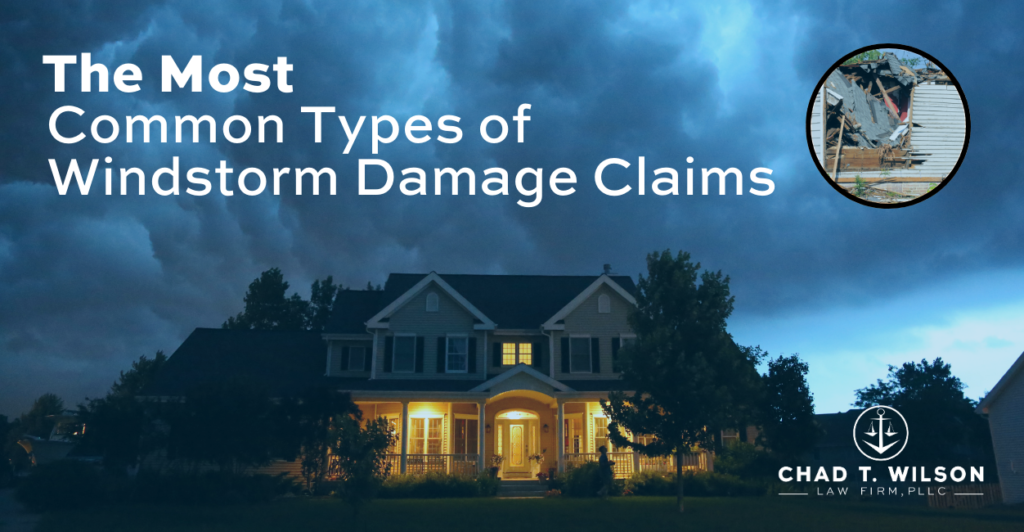These windstorms have the potential to cause a variety of property damages, such as:
Property owners should secure unsecured objects, trim trees and branches, reinforce weak places, and insure their property to reduce potential damages in the event of a windstorm.
Furthermore, minimizing the risk of damage and ensuring human safety during extreme wind events can be achieved by keeping up with weather forecasts and heeding evacuation warnings.
Is your claim being denied or underpaid? Call Chad T. Wilson Law Firm, PLLC.
Speak with one of our attorney if you’re having trouble getting your claim processed or if the insurance company is attempting to pay less for the claim than is reasonable.
Contact us: https://cwilsonlaw.com/contact-us/
Learn more about our attorneys:
https://cwilsonlaw.com/meet-the-team-chad-t-wilson-law-firm-pllc-insurance-attorney/
Follow us on Social media:
https://beacons.ai/chadtwilsonlaw
Contact our Chad T. Wilson Law Firm Office Locations to Schedule a free Consultation.
Chad T. Wilson is an attorney whose firm specializes in property insurance disputes.
Written By:
Alejandro Caro
What are the most common types of windstorm damage claims?
Windstorms can cause damage to property in a number of ways and can take many different forms, from gentle breezes to strong hurricanes and tornadoes.
These windstorms have the potential to cause a variety of property damages, such as:
Property owners should secure unsecured objects, trim trees and branches, reinforce weak places, and insure their property to reduce potential damages in the event of a windstorm.
Furthermore, minimizing the risk of damage and ensuring human safety during extreme wind events can be achieved by keeping up with weather forecasts and heeding evacuation warnings.
Is your claim being denied or underpaid? Call Chad T. Wilson Law Firm, PLLC.
Speak with one of our attorney if you’re having trouble getting your claim processed or if the insurance company is attempting to pay less for the claim than is reasonable.
Contact us: https://cwilsonlaw.com/contact-us/
Learn more about our attorneys:
https://cwilsonlaw.com/meet-the-team-chad-t-wilson-law-firm-pllc-insurance-attorney/
Follow us on Social media:
https://beacons.ai/chadtwilsonlaw
Contact our Chad T. Wilson Law Firm Office Locations to Schedule a free Consultation.
Chad T. Wilson is an attorney whose firm specializes in property insurance disputes.
Written By:
Alejandro Caro
Chad T. Wilson – Blogs and Resources
March, 22nd 2024
Updated: March, 22nd 2024 –12:30 p.m.
Source: https://cwilsonlaw.com/

What are the most common types of windstorm damage claims?
Windstorms can cause damage to property in a number of ways and can take many different forms, from gentle breezes to strong hurricanes and tornadoes.
These windstorms have the potential to cause a variety of property damages, such as:
Property owners should secure unsecured objects, trim trees and branches, reinforce weak places, and insure their property to reduce potential damages in the event of a windstorm.
Furthermore, minimizing the risk of damage and ensuring human safety during extreme wind events can be achieved by keeping up with weather forecasts and heeding evacuation warnings.
Is your claim being denied or underpaid? Call Chad T. Wilson Law Firm, PLLC.
Speak with one of our attorney if you’re having trouble getting your claim processed or if the insurance company is attempting to pay less for the claim than is reasonable.
Contact us: https://cwilsonlaw.com/contact-us/
Learn more about our attorneys:
https://cwilsonlaw.com/meet-the-team-chad-t-wilson-law-firm-pllc-insurance-attorney/
Follow us on Social media:
https://beacons.ai/chadtwilsonlaw
Contact our Chad T. Wilson Law Firm Office Locations to Schedule a free Consultation.
Chad T. Wilson is an attorney whose firm specializes in property insurance disputes.
Written By:
Alejandro Caro
Chad T. Wilson – Blogs and Resources
March, 22nd 2024
Updated: March, 22nd 2024 –12:30 p.m.
Source: https://cwilsonlaw.com/

What are the most common types of windstorm damage claims?
Windstorms can cause damage to property in a number of ways and can take many different forms, from gentle breezes to strong hurricanes and tornadoes.
These windstorms have the potential to cause a variety of property damages, such as:
Property owners should secure unsecured objects, trim trees and branches, reinforce weak places, and insure their property to reduce potential damages in the event of a windstorm.
Furthermore, minimizing the risk of damage and ensuring human safety during extreme wind events can be achieved by keeping up with weather forecasts and heeding evacuation warnings.
Is your claim being denied or underpaid? Call Chad T. Wilson Law Firm, PLLC.
Speak with one of our attorney if you’re having trouble getting your claim processed or if the insurance company is attempting to pay less for the claim than is reasonable.
Contact us: https://cwilsonlaw.com/contact-us/
Learn more about our attorneys:
https://cwilsonlaw.com/meet-the-team-chad-t-wilson-law-firm-pllc-insurance-attorney/
Follow us on Social media:
https://beacons.ai/chadtwilsonlaw
Contact our Chad T. Wilson Law Firm Office Locations to Schedule a free Consultation.
Chad T. Wilson is an attorney whose firm specializes in property insurance disputes.
Written By:
Alejandro Caro



